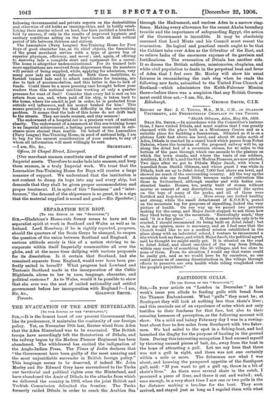THE EVACUATION OF THE ADEN HINTERLAND. [To THE EDITOR OF
THE "SPECTATOR."] SIR,—It is the honest boast of our present Government that, like its predecessor, it maintains the continuity of our foreign policy. Yet, on November 18th last, Reuter wired from Aden that the Aden Hinterland was to be evacuated. The British troops have accordingly left the Sanatorium of Dthala, and the railway begun by the Madras Pioneer Regiment has been abandoned. The withdrawal has excited the indignation of the Anglo-Indian Press. The Times of India declares that "the Government have been guilty of the most amazing and the most unjustifiable surrender in British foreign policy." This language seems to be deserved, if indeed Mr. John Morley and Sir Edward Grey have surrendered to the Turks our territorial and political rights over the Hinterland, and have abandoned the Amir of Dthala to the attacks from which we delivered the country in 1903, when the joint British and Turkish Commission delimited the frontier. The Turks formerly raided Dthala in order to reach the Arabian Sea through the Hadramaut, and enclose Aden in a narrow ring. fence. Making every allowance for the recent Akaba boundary trouble and the importance of safeguarding Egypt, the action of the Government is incredible. It may be absolutely assumed that Lord Minto and his Council must resent the evacuation. Its logical and practical result ought to be that the Cabinet take over Aden as the Gibraltar of the East, and, so relieve India of the enormous expense of its garrison and fortifications. The evacuation of Dthala has another side. It so dooms the British soldiers, missionaries, chaplains, and white civil population to death in the perpetual heat and fever of Aden that I feel sure Mr. Morley will show his usual fairness in reconsidering the rash step when he reads the following new facts, submitted to the United Free Church of Scotland—which administers the Keith-Falconer Mission there—before there was a suspicion that any British Govern- ment could thus act.—I am, Sir, &c., REPORT OF REV. J. C. YOUNG, M.A., M.B., C.M., OF GLASGOW UNIVERSITY, AND PRESBYTERIAN CHAPLAIN TO THE TROOPS.
"Sheikh Othman, Aden, May 9th, 1906.
DEAR DE. SanTil,—In accordance with the Committee's instruc. tions, I have visited Dthala, and must confess that I was greatly charmed with the place both as a Missionary Centre and as a suitable place for building a Sanatorium. Situated as it is on a plateau 5,000 feet above sea level, and about 98 miles north of Aden, Dthala is reached by a camel track which passes from Nobat Dakaim, where the terminus of the proposed railway will be, up along the dried bed of a mountain stream, for 40 miles to the bottom of the pass through which one ascends to the plateau on which the town stands, and where the tents of our soldiers, Artillery, K.O.S.B.'s, and the 81st Madras Pioneers, are now pitched. Two days after we got to Dthala Major Jacob, with whom I travelled from Sheikh Othman, and whose guest I was while in Dthala, took me up to Jebel Jehaf, 7,000 feet above sea level, and showed me much of the surrounding country. All the way up the mountain side one found little terraces under cultivation like those in Switzerland, although smaller and with better con- structed banks. Houses, too, neatly built of stones without mortar or cement of any description, were perched like eyries on the tops of many of the peaks, and all of these were
fortified and loop-holed Here every one looked healthy and strong, while the small detachment of K.O.S.B.'s, posted on the mountain top for purposes of signalling, looked the very picture of health. On our way up we passed two privates making for the camp, and Major Jacob stopped to ask them how they liked being up on the mountain. 'Exceedingly much,' they said, it is a fine place.' If, then, a sanatorium only is to be erected, I should recommend its being built on Jebel Jehaf ; but as, in my opinion, more is necessary, and as I feel sure that the Church would like to see a medical mission established in the place along with an industrial school, I venture to recommend a site which took my fancy, and which Major Jacob, the political agent, said he thought we might easily get. It is situated on the road to Jebel Jehaf, and about one-third of the way from Dthala, within easy reach of something like 50 villages, and too close to none of them. From its situation I would say that water could be easily got, and as we would here be by ourselves, no one could accuse us of causing dissatisfaction in the village through efforts to preserve our own health while riding roughshod over the people's prejudices."






































 Previous page
Previous page